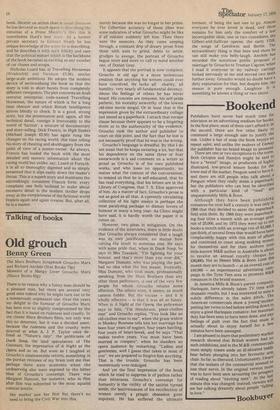Bookend
Publishers have never had much time for television as an advertising medium for booksIn the first place, most of them can't afford it. In the second, there are few titles likely t° command a large enough sale to justify the risk. Unlike a bar of soap the book enjoys DO repeat sales; and unlike the makers of Camay the publisher has no brand image to promote Thereare one or two exceptions to the norm. Both Octopus and Hamlyn might be said to have a "brand" image, as producers of highlY illustrated, low-priced leisure books for the lower end of the market; Penguin used to have it, and there are still people who talk about a Penguin when they really mean a paperback; but the publishers who can best be identified with a particular kind of "read" are unquestionably Mills & Boon. Although they have been publishing romances for over half a century it was onlY 1960 that they decided to enter the paperback field with them. By 1968 they were paperback" ing four titles a month with an average Print run of 25,000, and by 1975 they were up to ten books a month with an average run of 65,000. I can think of several firms that would have been complacently happy with this state of affairs and continued to coast along making money for themselves and for their authors (one little-known M&B author in Australia is about to receive an annual royalty cheque fOr £30,000). Not so Messrs Mills & Boon. Later this month they are to launch — at an overall cost of £40,000 — an experimental advertising paign in the Tyne Tees area to promote M8a5 romances in the brand manner. In America Mills & Boon's parent companY, Harlequin, have, already taken TV time with dramatic results, but I was interested to note a subtle difference in the sales pitch. The American commercials show a young-mother putting her twins to bed before settling down to enjoy a good Harlequin romance: her maternal duty has been seen to have been done, and anYr feelings of guilt over the fact that mum j5 actually about to enjoy herself for a feW minutes have been assuaged. I am pleased to learn that preliminary market research showed that British women had no such inhibitions, and in the M.&B. commercials mum simply tosses aside an ill-situated teddY bear before plunging into her favourite aro, chair. So far, so liberated. Unfortunately, I learn' that the makers of the commercial seemed to lose their nerve. In the original version mumt was to have been seen savouring the prospeo of reading about "exciting men". At the Ia.5.t, minute this was changed: instead, viewers Win see her talking dreamily about .people "falling in love." BookbuYer


























 Previous page
Previous page